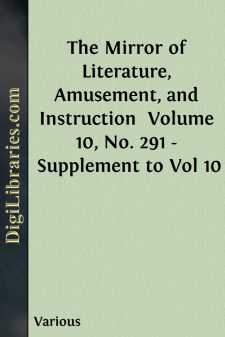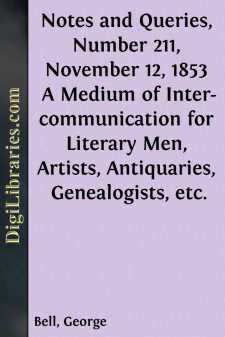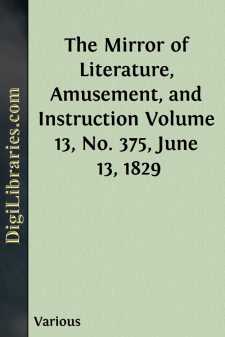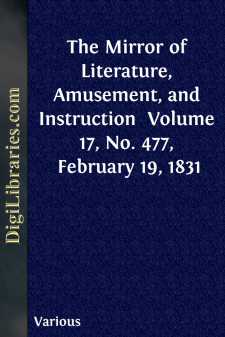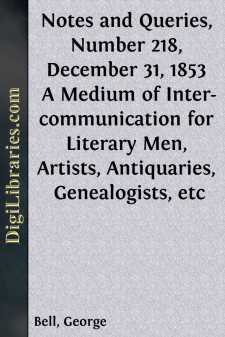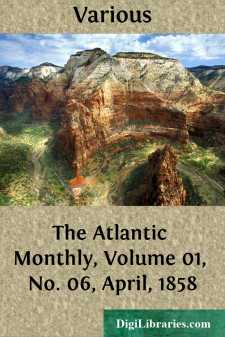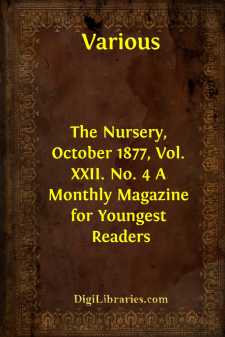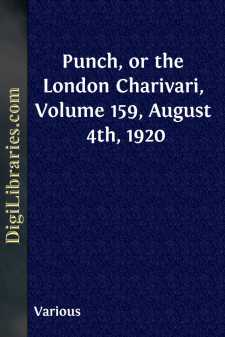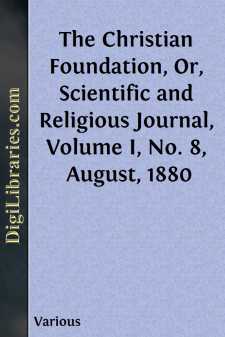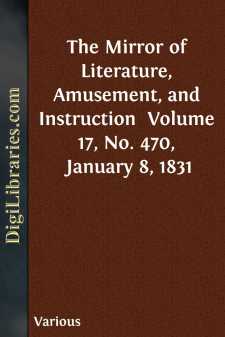Periodicals
- Art 27
- Children's periodicals 59
- Entertainment 5
- Food/Wine 2
- Games/Humor 455
- General 661
- Health 1
- History 53
- House/Home 1
- Regional 62
- Science/Nature 118
- Transportation 10
Periodicals Books
Sort by:
by:
Various
MEMOIR OF His Royal Highness the Duke of Clarence, LORD HIGH ADMIRAL OF ENGLAND. Ye sacred arks of Liberty! that float Where Tamar's waters spread their bosom wide, That seem, with towering stern and rampart stride, Like antique castles girt with shining moat: Should War the signal give with brazen throat, No more recumbent here in idle pride, Your rapid prows would cleave the foaming tide, And to...
more...
by:
George Bell
NOTES ON GRAMMONT. Agreeing with Mr. Peter Cunningham (vide History of Nell Gwyn), that a new edition of Grammont is much wanted, I beg to avail myself of your pages, and to offer a few remarks and notes which I have made in reference to that very entertaining work for the consideration of a future annotator. Of the several maids of honour mentioned therein I will begin with those of the queen. They...
more...
by:
Various
CUMBERLAND TERRACE, REGENT'S PARK. The annexed Engraving completes our Series of Architectural Illustrations of the REGENT'S PARK, and is, withal the most magnificent Terrace in the circuit. It stands considerably above the road, and is approached by a fine carriage sweep, with handsome balustrades; below which, and level with the road, is the garden, or promenade for the residents of the...
more...
by:
Various
MOUNT ST. MICHAEL, NORMANDY. The interest attached to this extraordinary place is of so popular a character as fully to justify its introduction to our pages. It is situate at the southern extremity of the ancient province of Normandy, a district of considerable importance in the early histories of France and England. The "Mount" is likewise one of the most stupendous of Nature's...
more...
by:
George Bell
Minor Notes. Italian-English (Vol. viii., p. 436.).—The following wholesale assassination of the English language was perpetrated in the form of a circular, and distributed among the British residents at Naples in 1832: "Joseph the Cook, he offer to one illuminated public and most particular for British knowing men in general one remarkable, pretty, famous, and splendid collection of old goods,...
more...
by:
Various
THE HUNDRED DAYS. PERSONAL REMINISCENCES. That period of history between the 20th of March and the 28th of June, 1815, being the interregnum in the reign of Louis the Eighteenth, caused by the arrival of Napoleon from Elba and his assumption of the government of France, is known as "The Hundred Days." It is as interesting as it was eventful, and has been duly chronicled wherever facts have been...
more...
by:
Various
THE PARROT THAT PLAYED TRUANT. LD Miss Dorothy Draper had a parrot. It was one of the few things she loved. And the parrot seemed to love her in return. Miss Dorothy would hang the cage outside of her window every sunny day. Sometimes an idle boy would come along, and poke a stick between the wires; and then the old lady would say, "Boy, go away!"But one day, when the window was open, and the...
more...
by:
Various
SOLVING THE HOLIDAY FARE PROBLEM. "None but the rich can pay the fare" is as true at this moment as when the words were first penned. The reference, of course, is to the return fare, for the single fare of tomorrow is hardly more than we paid without complaint in years gone by for the journey there and back. How comparatively few people seem to be aware that the solution of the difficulty lies...
more...
by:
Various
THE IMPORTANCE AND NATURE OF REFORMATION FROM SIN. This know also, that in the last days perilous times shall come; for men shall be lovers of themselves, covetous, boasters, proud, blasphemers, disobedient to parents, unthankful, unholy, without natural affection, truce breakers, false accusers, incontinent, fierce, despisers of those who are good, traitors, heady, high-minded, lovers of pleasure more...
more...
by:
Various
Few places in Britain can boast of higher antiquity than the city of Chichester. Its origin is supposed to date back beyond the invasion of Britain by the Romans. It was destroyed towards the close of the fifth century, by Ella, but rebuilt by his son, Cissa, the second king of the South Saxons, who named it after himself, and made it the royal residence and capital of his dominions. Chichester, as may...
more...


